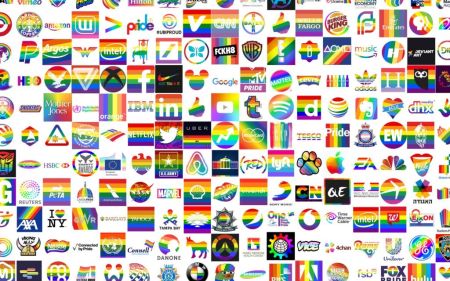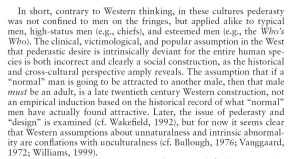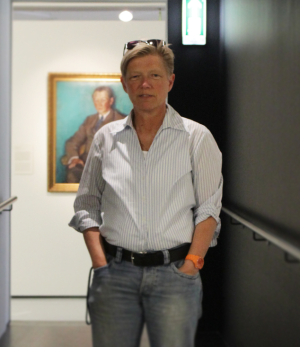One of our staff members is contributing considerably to a News Archiving service at Mu. Any well educated (Masters, PhD or above) users who wish to make comments on news sites, please contact Jim Burton directly rather than using this list, and we can work on maximising view count.
Rainbow Revisionism

Rainbow Revisionism is a phenomenon whereby historical queer figures and events are either memory-holed or sanitized in such a way as to remove expressions of queerness deemed inconvenient to the "political objectives" of the modern LGBTQ+ Movement. Usually, the target of this revisionism is historical pederasty. While revisionism is a discrete form of information warfare, the Rainbow Reactionaries who promulgate it may at the same time enjoy the lower-brow practise of Validity Policing. The revisionist phenomenon is thought to have increased in its velocity since the exclusion of pederasts from the gay movement in the 80s, which was formalized in the 90s.
A more aggressive form or Rainbow Revisionism has been described as "gaywashing". Here, historical examples of "gayness" are aggressively inserted into a person's legacy in order to reify modern notions of egalitarian homosexuality.[1] Pinkwashing refers more often to opportunistic whitewashing of commercial brands and messages with pro-LGBTQ+ mantra.
Well-known subjects of Rainbow Revisionism
The history of homosexuality itself is a subject of Rainbow Revisionism, as documented by Bruce Rind, in his analysis of various texts in 1998.[2] As our article points out, the events of Stonewall are routinely whitewashed, as are the following movement's manifestations against the Age of Consent - including those supported by celebrated founding members and the ILGA umbrella. Publications such as Spartacus International Gay Guide are good examples of how the gay movement and press whitewashed their history throughout the 1980s and 90s. The hostile reaction of the gay press to a pederastic novel, Alexander's Choice is another telling example.

One example of this rewriting of history is the gay New York Times journalist, Anthony Tommasini describing Franz Schubert's reported partners as "adolescent men", a category otherwise unheard of in any form of commentary or analysis.[4] In another, a famous book by John Addington Symonds (in effect, a treatment of Pederasty), was recalled as "promoting the morality of same-sex relations".[5] The piece contains the first known mention of the term boylove.
The following prominent pederasts are either worshipped as "gay icons", or assumed to be homosexual in the modern, sanitized sense:
The following prominent pederasts have been permitted a public legacy, while certain aspects of their homosexuality have been ignored:
Gay Erotic Literature, Film and Pornography
Karl Andersson has noted that during the 1990s, there existed a "boy" genre of gay male pornography, in which the youths depicted were from around the age of 16 or so, and often hired casually on fake IDs. Documenting the legal controversy surrounding Sebastian Bleisch (a gay porn producer who specialized in such content), Andersson identifies the subsequent disappearance of "boy" content and emergence of the post-internet "twink" genre as a major assimilationist juncture. Following the 1990s, the "twinks" depicted were mainly men in their 20s, shorn of their hair and "dragged up" to look like the teenage boys who would never return to the screen, but for the darker corners of the internet.
-
Credit: Karl Andersson
-
Credit: Karl Andersson
Similar trends were seen in the screen adaptations of Queer as Folk. In the 1999 British series, Nathan Maloney is aged only 15 when he insists on being defiled, whereas Justin Taylor in the later American adaptation was 17.
Historical forgiveness coefficient
When assessing the case of many a historical pederast - it often becomes apparent that the earlier they lived, the more likely they are to be assumed a "straight gay" for pederasty that would be deemed unfathomable by modern-day standards and incompatible with gay identity. What this appears to reveal is that modern "queerness" and "gay identity" is more of a political project than its proponents are willing to admit.
"Coming to terms" with inconvenient 20th century pederasty

On some occasions, historical examples of LGBT-MAP unity have been deliberately acknowledged by gay thought leaders, and then arbitrarily disavowed with overt displays of pedophobia. In 2023, a Berlin gay museum presented an exhibition doing just that, entitled "Sexualized violence against children and young people in the context of emancipation". According to the museum, both institutions involved had "committed themselves to consistently coming to terms with the disturbing fact that the communities whose legacy they are preserving offer space for sexualised violence against children and young people and their trivialization or ideological justification". A press release even suggested that the movement of the time was "susceptible" to the "rhetoric of perpetrators". This charge is perhaps related to just how strongly German gay organizations fought back against the sidelining of pederasts in the late 80s and 90s, albeit under no external pressure to side with them. In the founding statutes of the Museum itself, "boy lovers" were still listed as a "group to be appreciated" up until 2010, according to its curator.[7]
"Woke" liberal revisionism
Some heterodox and right-leaning LGBT people and their supporters[8] complain that since the ascendancy of hyper-orthodox social-justice informed identity politics in the 10s, aspects of their history are being re-written by progressive activists. This is alleged (again) in the example of Stonewall and the New York Gay Scene. Already cleansed of their pederastic significance, the riots are now erroneously said to have been "started by a black trans woman", leading honest supervisors to advise their students to ignore sources published after 2010.[9]
The term has also been used by conservatives in reference to attempts by gay activists to influence traditional cultures usually seen by liberals as in need of protection.[10]
See also
References
- ↑ Gaywashing
- ↑ Rind, B. (1998). Biased use of cross‐cultural and historical perspectives on male homosexuality in human sexuality textbooks. Journal of Sex Research, 35(4), 397–407.
- ↑ Bruce Rind - Pederasty: An Integration of Empirical, Historical, Sociological, Cross-Cultural, Cross-Species, and Evolutionary Evidence and Perspectives in eds Hubbard and Verstraete
- ↑ NYT: Adolescent Men
- ↑ Queerty Pederastic Erasure
- ↑ Hajo Ortil
- ↑ Schwules Museum Berlin plant Ausstellung zu sexuellem Missbrauch, Ausstellungsvorhaben Pädosexuelle Netzwerke and Gemeinsame Ausstellung
- ↑ Lotus Eaters video podcast on "Rainbow Revisionism" re. Trans Identity
- ↑ Reddit thread
- ↑ National Review: Rainbow Revisionism

